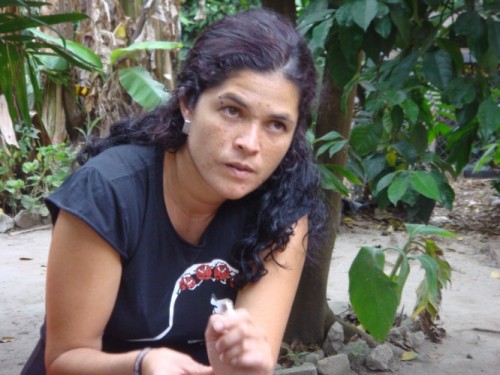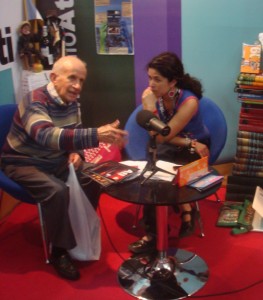The State of Journalism in Guatemala Today: Interview with Lucía Escobar
by Zach Tackett / June 18, 2012 / 3 Comments
In October of 2011, the life of Guatemalan journalist, Lucía Escobar completely changed. Escobar wrote an opinion column, “De cuervos, ojos y demonios” (“Of ravens, eyes and demons”) for the national newspaper, El Periódico. In a piece no longer than 400 words she blamed board members of Panajachel’s local security commission for their responsibility in the disappearance of a local man, Luis Gilberto Tian Sente. She accused them of representing and defending the encapuchados, a vigilante group that has been responsible for many illegal crimes in the name of “justice.”
In the days following the publication of the article, Escobar received multiple threats through anonymous emails. In addition, some of the people she mentioned in her column accused her of drug trafficking on a local television channel, while another said that she belonged in the “rubbish heap” along with all of her writing. After these threats, Escobar was forced into hiding with her family, leaving Panajachel, one of the biggest tourist destinations in Guatemala and their home for many years.
For speaking out against the encapuchados despite the threat of vengeance, Escobar was included on the shortlist for Index on Censorship’s 2011 Freedom of Expression Awards. Two of the individuals accused in her column, Juan Manuel Ralón and Víctor Anleu, the president and vice-president of the security commission at the time of the article’s publication, were sentenced to 17- and 19-year jail sentences, respectively. Escobar continues to write as a journalist and operate Radio Atí, a Guatemalan radio station that often publicizes cultural events.Escobar answered interview questions for Sampsonia Way via email and talked about the events of last October and the current situation for journalists in Guatemala, especially with the recent election of General Otto Perez Molina who has promised to make the country safer for journalists, but who has also been linked to atrocious war crimes that took place during the thirty-year civil war which ended in 1996.
Can you summarize what you said in the article, “De cuervos, ojos y demonios”?
On October 19, 2011 after hearing the testimony of Lorena Caal, the wife of a missing carpenter who was beaten by members of the municipal security commission, I wrote an opinion column in ElPeriódico. Based on my experience in the community and my knowledge of the situation, I stated who I considered accomplices through their indifference for his injury and disappearance. I blamed the ex-mayor of Panajachel, Gerardo Higueros, as well as the Board of Directors for the Municipal Security Commission of Panajachel: Juan Manuel Ralón, Victor Anleu, and Teresa Coello Puente.
In various columns, you wrote about some of the encapuchados’ other illegal actions. Are you able to summarize some of the most important ones?
The crimes include imprisoning citizens illegally, closing roads and streets, usurping power. They are responsible for beating, threatening, and disappearing citizens. They are also associated with illegal organizations.
These groups of encapuchados who have been compared with the Civil Self-Defense Patrols and military commissioners during the Civil War are a real, emerging problem for the country. You recently publicized an article about another group of encapuchados that cancelled a concert using violent tactics because the rockers “appeared suspicious.” What kind of power could these groups gain if the government is not able to curb them?
In many communities like San Juan Sacatepéquez, these groups represent an alternative force that carries out social cleansing or imposes curfews at their convenience. Only two percent of the murders that are committed in Guatemala reach the stage of trial and conviction. As a result, there has been a proliferation of these vigilante groups, which are generally approved of by a large part of the population. If the government does not pay attention soon, anarchy will begin to take hold of the country.
Do you think that this new government is able to do something about these groups?
They would be able to if they would focus on the situation, but it doesn’t appear that anyone from the government intends to do anything. It seems as if they just want to steal the state’s money.
“If the government does not pay attention soon, anarchy will begin to take hold of the country.”
In “De cuervos, ojos y demonios” you mentioned the names of those who were defending and representing the encapuchados. Now two of the people that you named, the then president and vice-president of the Security Commission for Panajachel, are in prison. What is the current situation of their judicial process?
Juan Manuel Ralón and Víctor Anleu were sentenced to 17 and 19 years, respectively, for serious and minor assault as well as for coercion. And, as far as I understand, this is just one of the judicial processes they face. With respect to my own case, the special prosecutor for crimes against journalists was able to connect Juan Manuel Ralón with the threats against me. They have been working for two months to build a case, but they have yet to begin the judicial process.
Has there been any progress in the case of the disappearance of Luis Gilberto Tian Sente?
I was told that the prosecution has an eyewitness, but they have yet to find the body, making the entire process difficult.
In an anonymous email that you received on May 3rd, someone threatened you by saying that they would bring to light, “new truths about you.” Distributing misinformation and publicly discrediting opponents were successful tactics during the war. Would you say that these practices are recurring in present day in order to silence journalists? How does one fight against this?
Yes, it appears that they are using the same tactics as always: Discrediting and criminalizing their opponents. They are still encapuchados, but now they are online. Sending anonymous messages and hiding behind a machine is all they can do for now. How do we fight against it? With the tools we have: The written word, the free flow of information, and we have to keep doing what we think is right.
“There is self-censorship because journalists need to balance their life, their security, their community, and their family.”
What is the current situation in Panajachel? Have there been any changes in the civil structure of the encapuchados?
With the succession of the newly elected government on January 14, a new mayor and a new directive committee have taken power. I assume that they will also change the members of the Security Commission and they will avoid repeating illegal actions.
Other journalists wrote articles about the encapuchados and about the threats against you after your article was published. What has happened with those persons?
The day after I was threatened, a journalist from Guatevisión that was covering the case was threatened over the phone. He put in a complaint, but the following day he withdrew it in fear because he continues to live in the area with his family. He continues to work for Guatevisión, but he has not covered anything more on the topic.
In a video from Al Jazeera, Barbara Scheiber from The Guatemala Times explained that you faced all these problems because you published the names of those involved. Juan Luis Font of El Periódico said that it’s undeniable that there is self-censorship in Guatemalan journalism. Are you in agreement with these opinions?
Yes, there is self-censorship because journalists need to balance their life, their security, their community, and their family. It’s more difficult for freelancers to report on these issues because they don’t have a media outlet to back them up, and it’s very difficult for small villages’ correspondents because there is more danger of retaliation.
Some of the interviewees in the video are optimistic concerning the changes that General Otto Pérez Molina promises. Do you agree with them?
No. It has been six months of this new government, and they have already imposed a curfew and violently repressed a protest by high school students. My optimism is for the people, the citizens who have already shown that they are not going to permit the outrages that occurred in the 80s and who have a few more tools of free expression and access to a timid, but hopeful, justice.
In your opinion, what are the biggest problems that Guatemalan journalists must confront?
Guatemalan journalism suffers from the global tendency of more photos and less text, which makes the information banal and prevents the reader from delving into the issue. Additionally, newsrooms are getting smaller and the mass media has a tendency to buy information from agencies instead of producing it, making a uniform agenda across all of the media outlets. In addition, drug traffickers threaten them physically while big business empires (monopolies), and transnational organizations (as mining and hydroelectricity organizations) threaten to remove their advertising when you speak badly of them.
Be sure to also check out Escobar’s blog, Mujer Bonita es la que Lucha, where she continues to write and report.







3 Comments on "The State of Journalism in Guatemala Today: Interview with Lucía Escobar"
Viscerally, it terrifies me to hear of such s lovely, dynamic person such as Ms. Escobar threatened.
Not only is she a lovely human being, who happens to be a woman, but a potential victim.
Hi! Quick question that’s entirely off topic.
Do you know how to make your site mobile friendly?
My site looks weird when viewing from my iphone 4. I’m trying to
find a template or plugin that might be able to resolve
this problem. If you have any recommendations, please share.
Many thanks!
Lucia Escobar is a Liar.. most of her interview is fake. !!!!